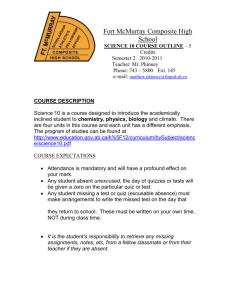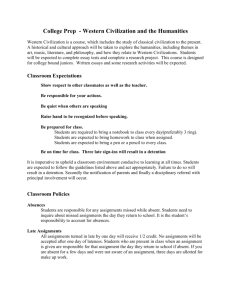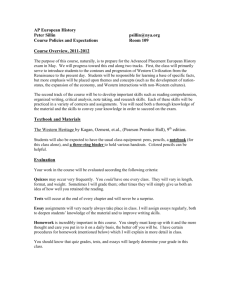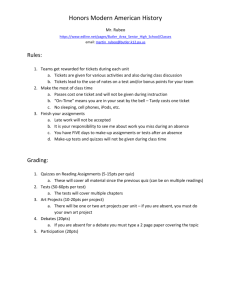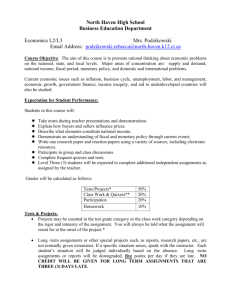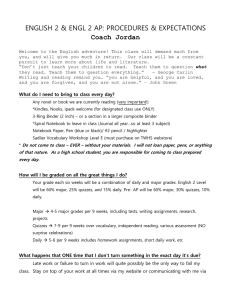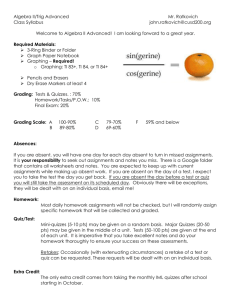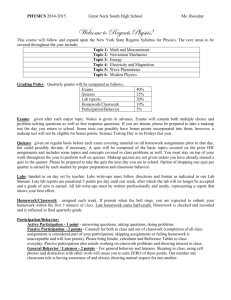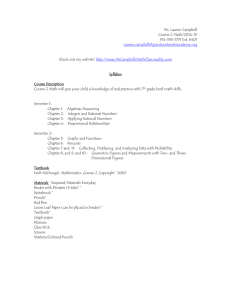Course Syllabus - APW School District
advertisement
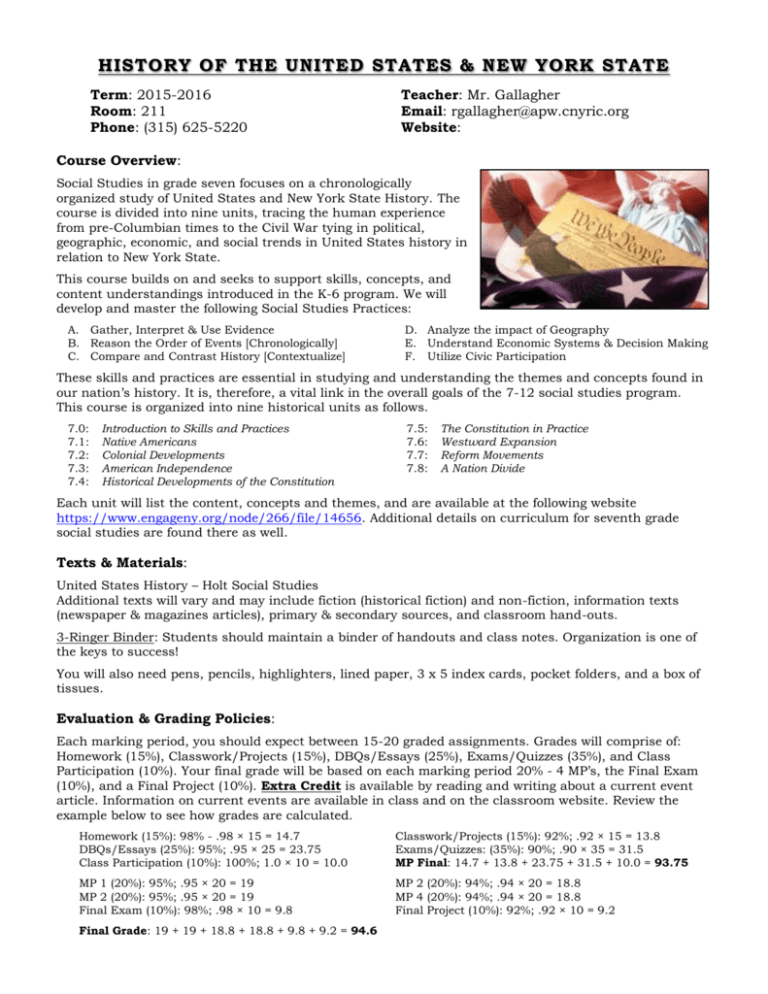
HISTORY OF THE UNITED STATES & NEW YORK STATE Term: 2015-2016 Room: 211 Phone: (315) 625-5220 Teacher: Mr. Gallagher Email: rgallagher@apw.cnyric.org Website: Course Overview: Social Studies in grade seven focuses on a chronologically organized study of United States and New York State History. The course is divided into nine units, tracing the human experience from pre-Columbian times to the Civil War tying in political, geographic, economic, and social trends in United States history in relation to New York State. This course builds on and seeks to support skills, concepts, and content understandings introduced in the K-6 program. We will develop and master the following Social Studies Practices: A. Gather, Interpret & Use Evidence B. Reason the Order of Events [Chronologically] C. Compare and Contrast History [Contextualize] D. Analyze the impact of Geography E. Understand Economic Systems & Decision Making F. Utilize Civic Participation These skills and practices are essential in studying and understanding the themes and concepts found in our nation’s history. It is, therefore, a vital link in the overall goals of the 7-12 social studies program. This course is organized into nine historical units as follows. 7.0: 7.1: 7.2: 7.3: 7.4: Introduction to Skills and Practices Native Americans Colonial Developments American Independence Historical Developments of the Constitution 7.5: 7.6: 7.7: 7.8: The Constitution in Practice Westward Expansion Reform Movements A Nation Divide Each unit will list the content, concepts and themes, and are available at the following website https://www.engageny.org/node/266/file/14656. Additional details on curriculum for seventh grade social studies are found there as well. Texts & Materials: United States History – Holt Social Studies Additional texts will vary and may include fiction (historical fiction) and non-fiction, information texts (newspaper & magazines articles), primary & secondary sources, and classroom hand-outs. 3-Ringer Binder: Students should maintain a binder of handouts and class notes. Organization is one of the keys to success! You will also need pens, pencils, highlighters, lined paper, 3 x 5 index cards, pocket folders, and a box of tissues. Evaluation & Grading Policies: Each marking period, you should expect between 15-20 graded assignments. Grades will comprise of: Homework (15%), Classwork/Projects (15%), DBQs/Essays (25%), Exams/Quizzes (35%), and Class Participation (10%). Your final grade will be based on each marking period 20% - 4 MP’s, the Final Exam (10%), and a Final Project (10%). Extra Credit is available by reading and writing about a current event article. Information on current events are available in class and on the classroom website. Review the example below to see how grades are calculated. Homework (15%): 98% - .98 × 15 = 14.7 DBQs/Essays (25%): 95%; .95 × 25 = 23.75 Class Participation (10%): 100%; 1.0 × 10 = 10.0 Classwork/Projects (15%): 92%; .92 × 15 = 13.8 Exams/Quizzes: (35%): 90%; .90 × 35 = 31.5 MP Final: 14.7 + 13.8 + 23.75 + 31.5 + 10.0 = 93.75 MP 1 (20%): 95%; .95 × 20 = 19 MP 2 (20%): 95%; .95 × 20 = 19 Final Exam (10%): 98%; .98 × 10 = 9.8 MP 2 (20%): 94%; .94 × 20 = 18.8 MP 4 (20%): 94%; .94 × 20 = 18.8 Final Project (10%): 92%; .92 × 10 = 9.2 Final Grade: 19 + 19 + 18.8 + 18.8 + 9.8 + 9.2 = 94.6 Standards & Classroom Expectations: Students are reminded to review the Altmar-Parish-Williamstown Code of Conduct, see the Student Handbook. Attendance: Students are expected to be in class every day and are responsible for all announcements made in class and for all materials. All handouts, instructions and resources (where possible) will be posted in the classroom. Make-up and Late Assignments: Assignments are due at the beginning of class on the due date. Late submissions will be penalized 25% per day late. If you are absent on the due date of an assignment, it will be due the on the day of your return. It is your responsibility to get missed assignments and/or notes when you are absent and make arrangements for make-ups. As with late work, difficult circumstances are exceptions, and will be dealt with on a case-by-case basis. Talk to me if you are unable to complete your work; give yourself every chance to succeed. If you are absent on the day of a test or quiz, you must make up it within two days of your return on your own time. Any assignment(s) not made up will receive a grade of zero! If you are absent the day before a quiz or test, but present the day of, you will be expected to take it. If a quiz or test is scheduled the day of a band and/or choral lesson, you will be expected to complete the assessment first. Class Participation: This is an important part of the course. Active class participation is expected in most high school classes, so now is the best time to develop or improve that skill. All students are encouraged to voice their position though it must be understood in history we require evidence to support them. A great student will not only be prepared to defend their position but also change it if necessary. The aim of any social studies course is less to provide specific answers than to examine the truth of those we think we have already. Behavior: The following are classroom policies: [Polite] Be respectful of your teachers, classmates, and environment. Put-downs, rude comments, and inappropriate language will not be tolerated. [Prompt] Be on time to class in your seat when the bell rings. [Prepared] Be prepared when the bell rings to start class with all required materials. [Productive] Be on task with all materials working productively. Maintain appropriate classroom behavior and use your class time wisely. Cell phones (and other personal electronic devices) will not be used in the classroom. If I see it out I will assume you are going to use it. Any student caught with a cell phone (and other personal electronic devices) out in class (the first time) will be asked to put the cell phone away. If the offense occurs a second time, the cell phone will be confiscated and returned to the student at the end of the class period and parents will be contacted. The third (and any subsequent offenses), the student will be sent to the office and a disciplinary referral will be written. FOLLOW THE 3 P’S BE PROMPT, POLITE, PREPARED, & PRODUCTIVE Any student found in violation of these rules will be counseled. If the student continues to violate these rules disciplinary actions will follow to include a phone call home and written referrals to administration. Any student who disrupts one’s ability to learn or the teacher’s ability to teach will be removed from the classroom and a phone call home will be made along with a referral to administration. Extra Help: If you would like extra help, please make every effort to attend after school study sessions which are from 2:30 to 3:30 on Tuesdays and Thursdays. These sessions can also be used for working on assignments and making-up missed quizzes or tests. We reserve the right to require a student to attend an after school study session. Communication is the key to success. Ask me when you need help; I cannot help you if you do not ask! “I am convinced that life is 10% what happens to me and 90% how I react to it. And so it is with you… we are in charge of our attitude.” – Charles Swindoll I am looking forward to a great year!!!


